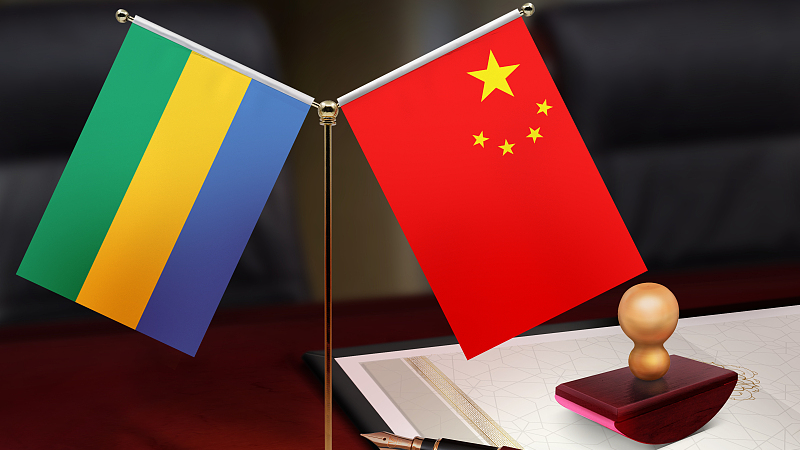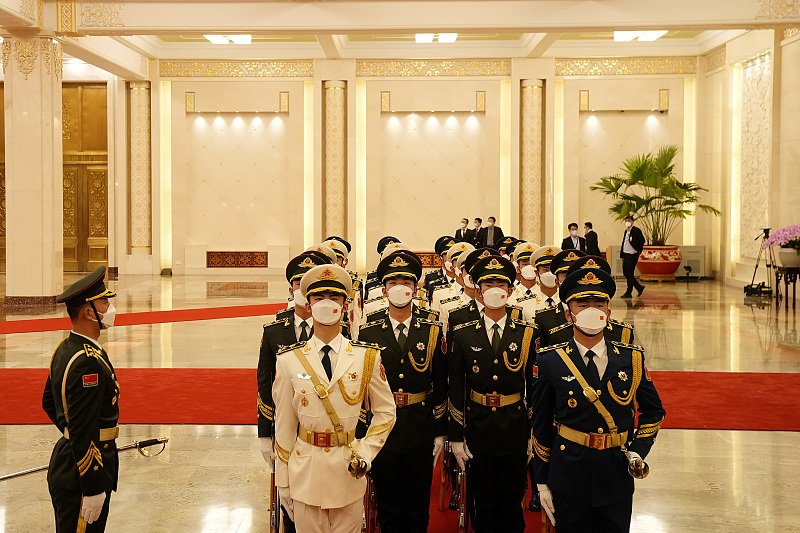
National flags of Gabon and China. /CFP
National flags of Gabon and China. /CFP
Editor's note: Bereket Sisay is a commentator of international affairs, with a special focus on Africa. The article reflects the author's opinions and not necessarily the views of CGTN.
Gabonese President Ali Bongo Ondimba departs after concluding a successful four-day visit to China. During the visits, China and Gabon decided to upgrade the comprehensive cooperative partnership between the two countries to a "comprehensive strategic cooperative partnership." Since the establishment of diplomatic relations five decades ago, the two countries have consolidated their partnership over multitudes of frontiers under the framework of the Forum on China-Africa Cooperation (FOCAC).
Gabon, as a strategic partner in the Belt and Road Initiative (BRI), has also been receiving loads of support from China in different development fields. China has helped Gabon improve its infrastructure development, and its enterprises have also made important contributions to Gabon's economic progress.
China is Gabon's largest trading partner, with two-way trade reaching $4.55 billion in 2022, up by more than 50 percent year on year, while China-Africa trade volume reached a record high of $254.29 billion in 2021. Gabon, a small country in Central Africa with a population of around 2.3 million, is rich in natural resources and the fourth largest oil producer in Sub-Saharan Africa. As a result, the country is heavily dependent on its oil and minerals.
However, in a bid to build a vigorous economy, Gabon has recently decided to diversify the country's economy, and therefore, this visit could be a new impetus to advance the cause as the sides decide to further strengthen their cooperation in various sectors. In this regard, China's commitment may provide more support for Gabon's processing and manufacturing industries. The new agreement to uplift synergy between the Emerging Gabon Strategic Plan and the Belt and Road Initiative to diversify the nation's economy would be highly significant.
The past two decades proved that China's investment in Africa contributed significantly to income rises, trade, and the invigoration of the industrial economy, but it also played a crucial role in advancing the soft side of development, such as technologies, labor training, and business management knowledge transfer.
Moreover, Africa's economy and its development will surely be better off with FDIs than without them. Thus, China's further engagement, especially in the non-oil sector, will push the country onto a positive growth trajectory and boost its overall economic performance. The African Development Bank says the short-term outlook for Gabonese economic growth is favorable, with projected GDP growth of 3.4 percent in 2023, reflecting a dynamic non-oil sector (agriculture, wood, and mining). In sync with this perspective, China could play a catalyst role in supporting Gabon to fulfill its economic ambitions.

Members of Chinese honor guard are seen prior to the welcome ceremony for Gabonese President Ali Bongo Ondimba at the Great Hall of the People in Beijing, China, April 19, 2023. /CFP
Members of Chinese honor guard are seen prior to the welcome ceremony for Gabonese President Ali Bongo Ondimba at the Great Hall of the People in Beijing, China, April 19, 2023. /CFP
According to the Africa Development Bank, 88 percent of Gabon is covered by forest, which constitutes a carbon pool by absorbing four times more carbon dioxide than it gives off, Yet, the nation is exposed to rising sea levels, frequent flooding, and coastal erosion, which affect key sectors such as hydropower, agriculture, fishing, and forests.
Therefore, China's willingness to cooperate on agriculture and forests would have a huge impact on reversing all the above climate change-related threats and catastrophes. This certainly contributed to forestland resilience while helping to protect fauna and flora with the creation of protected areas covering 11 percent of Gabon's national territory.
On the other hand, Gabon is a country known for its environmental biodiversity. It has a huge potential to attract tourists from around the world, making the sector an important component of its total economic output. Equally, China has succeeded in developing the service sector and enhancing its comprehensive contribution to GDP. Thus, the strategic partnership over the sector will have a huge gain for Gabon as it strives to advance the sector and diversify its economy.
This holistic approach to cooperation will help China-Gabon cooperation evolve in a world of far-reaching changes and widespread turmoil. Also, the two countries will continue to uplift their cooperation in the global multilateral arena, where their core interests tie up together and major concerns converge.
Hence, Gabonese President Bongo's visit to China is a new step in refreshing bilateral relations as well as the Sino-China partnership. This visit is symbolic, as it signals that China has always stood by the principle that all countries, big or small, are equal, as well as on the side of emerging countries, particularly to develop and revitalize together with African countries.
Moreover, it indicates the China-Africa partnership is gaining momentum against all the Western attempts to fend off and decouple China from having a friendly relationship with Africa. The visit is also substantive, as it spells out additional areas of mutual engagement for further practical development cooperation to continue to deliver tangible results that would have far-reaching effects across the wider continent.
(If you want to contribute and have specific expertise, please contact us at opinions@cgtn.com. Follow @thouse_opinions on Twitter to discover the latest commentaries in the CGTN Opinion Section.)